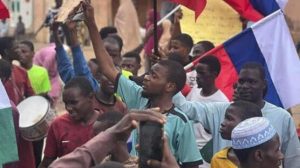Nigerian Protesters Face Treason Charges for Waving Russian Flags
In a dramatic escalation of tensions surrounding ongoing protests in Nigeria, the military has announced that individuals waving Russian flags will face treason charges. This declaration comes amid widespread demonstrations against government policies, raising questions about national loyalty and the implications of foreign symbols in domestic unrest.
The protests, which began several days ago, have seen thousands of Nigerians take to the streets in cities like Port Harcourt and Kaduna, voicing their grievances over issues such as economic hardship, corruption, and governance failures. However, the appearance of Russian flags among the demonstrators has drawn the ire of military officials, who view this act as a direct challenge to Nigeria’s sovereignty.
Military Warns of Treason Charges
Chief of Defense Staff, General Christopher Mustapha, stated unequivocally that those displaying the Russian flag are committing a treasonable offense, a claim that has intensified the already fraught atmosphere surrounding the protests. During an emergency meeting with President Bola Tinubu, military leaders expressed their concerns over the potential implications of foreign flags at protests.
General Mustapha emphasized that such actions could undermine national security and encourage anti-government sentiments. “We will not tolerate any acts that threaten our unity and sovereignty,” he declared, underscoring the military’s commitment to maintaining order during this period of unrest.
Criticism and Concerns
Critics of the government have pointed out that the military’s response may be an overreach, arguing that waving a foreign flag should not automatically equate to treason. Debo Ologunagba, the National Publicity Secretary of Nigeria’s main opposition party, the Peoples Democratic Party (PDP), condemned the military’s stance, calling it an attempt to stifle dissent.
“While we do not support the display of foreign flags, we must recognize the right of citizens to protest peacefully,” he stated. This sentiment echoes among many Nigerians who believe that the government should address the root causes of the protests rather than resorting to threats of legal action.
Symbolic Gesture or Treason?
The protests have been fueled by a sense of frustration among the populace, particularly in light of rising living costs and inadequate public services. Many demonstrators argue that the government has failed to deliver on its promises, leading to a growing disillusionment with political leadership.
The decision to display Russian flags, while controversial, may be seen as a symbolic gesture of solidarity with other nations that have challenged Western dominance, reflecting a desire for a shift in Nigeria’s foreign policy.
Potential Crackdown on Dissent
As the protests continue, the military’s warning has raised concerns about potential crackdowns on dissent. Activists fear that the treason charges could be used to intimidate protesters and discourage participation in the demonstrations.
The specter of legal repercussions looms large, with many wondering how far the government is willing to go to quell dissent. The situation is further complicated by the fact that the protests have garnered international attention, with various human rights organizations calling for restraint from the Nigerian military.

Protesters Vow to Continue
In response to the military’s announcement, some protesters have vowed to continue their demonstrations, asserting that their right to free speech and assembly is paramount. “We will not be silenced by threats,” one protester declared, holding a sign that read, “Our voices matter!” This determination highlights the resilience of the Nigerian people in the face of adversity, as they seek to hold their leaders accountable.
International Implications
As the situation unfolds, the international community is watching closely. The implications of the military’s actions could reverberate beyond Nigeria’s borders, influencing perceptions of governance and human rights in the region.
Analysts suggest that how the government handles this crisis could determine its legitimacy in the eyes of the public and the international community alike.
Conclusion
The Nigerian military’s announcement regarding treason charges for those waving Russian flags has added a new layer of complexity to the ongoing protests. As citizens continue to express their frustrations over governance, the government’s response will be crucial in shaping the future of political discourse in Nigeria.
The coming days will likely reveal whether the military’s hardline stance will quell dissent or further galvanize the movement for change.

